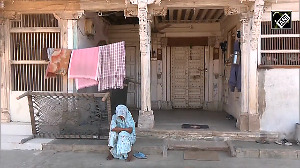
On the night of July 2, 1995, Delhi police constable Abdul Nazir Kunju and Home Guard Chanderpal saw smoke emanating from the open-air Bagiya Restaurant in Ashok Yatri Nivas (now called Indraprastha Hotel).
They got suspicious and scaled the hotel's boundary wall to enter the premises. 'Something big' was burning in a tandoor (a clay oven) in the restaurant.
That 'something big' turned out to be the body of Naina Sahni (29), who was allegedly killed by her husband and the then Delhi Youth Congress president Sushil Sharma.
Also see: Verdict in tandoor case on Wednesday
Since the flames were touching the restaurant's ceiling, the two, in order to stop it from spreading, doused the fire with water. Later, while deposing in court, Kunju and Chanderpal stated that the restaurant manager Keshav Kumar claimed 'he was burning Congress banners'.
The police immediately arrested Kumar, but Sharma, who was running the restaurant on a contract and was present when the body was being disposed off, managed to flee. He surrendered on July 10, 1995.
The two have been languishing in judicial custody ever since; three other co-accused are out on bail.
According to the 19-page charge sheet submitted by the police, Sharma doubted Sahni's fidelity. He believed she was having an affair with her classmate and fellow Congress worker Matloob Karim. This suspicion led to marital discord and, the police alleged, domestic violence. Besides, Sharma wanted to keep his marriage with Sahni a secret, which the latter opposed.
On July 2, when Sharma reached his flat at Mandir Marg in the heart of the capital, he saw Sahni talking on the telephone.
Seeing him, she put down the receiver. Sharma re-dialed the number to find out who was on the other end. His suspicion was confirmed when Karim answered the phone.
Incensed, Sharma allegedly fired three shots from his licensed revolver at Sahni. One bullet pierced her head, another hit her in the neck while the third missed her and hit an air-conditioner.
Sahni died on the spot. Sharma wrapped her body, took it to the restaurant, chopped it into small pieces and tried to burn it in the tandoor.
That night, Sharma stayed with his Indian Administrative Service officer friend D K Rao at Gujarat Bhavan and left for Jaipur the next day. With the police on his trail, he then went to Mumbai and later Chennai.
A police team led by Additional Commissioner of Police Maxwell Pereira flew to Chennai, but Sharma fled to Bangalore, where he surrendered on July 10, 1995.
When the case went to trial, Sharma and Kumar pleaded innocence.
The murder had sent shockwaves across the capital. Tandoors being ubiquitous in Delhi, it was hard to go to a restaurant and not discuss the case, which has seen as many twists as can be expected in the Indian judicial system.
The case, in fact, came to a standstill in August 2000 after Sharma moved the Delhi high court following the transfer of Additional Sessions Judge G P Thareja, who was hearing the case, from a criminal to a civil court. His counsel Jayant Sud sought transfer of the case from the court of additional sessions judge V K Jain to Thareja on the ground that the latter had heard it from the beginning and had almost completed recording of evidence of all witnesses. The plea was upheld.
In August 2001, additional solicitor general K K Sud - who was appointed as amicus curiae (friend of the court) - withdrew as Sharma's counsel.
Thareja asked six advocates to assist the court. But on November 17, 2001, they refused to defend Sharma as the terms and conditions were unacceptable to them. Since then, Sharma's been without a lawyer.
Now all 105 witnesses have been examined and the trial is nearly over.
In 2001, investigation officer Niranjan Singh told a website: "We have a foolproof case against the accused. The motive of the crime was clear from the very beginning - the accused doubted Sahni's character. Their marriage was under tremendous pressure as he was torturing her. He didn't want their marriage to be made public. Sahni wanted to leave Sharma and go abroad."
Sahni's parents just want it (the trial) to end. Asked for an interview in 2001, her 77-year-old father, Harbhajan Singh, said: "Go away. Why do you want to talk about her? I don't. She's gone and nothing can bring her back. You can't solve anything. Can you get me justice? Tell me, what kind of a father am I, who couldn't get justice for his daughter? Let me forget it all. Don't remind me of her.
"I have to protect my family. After the incident our well-wishers told us not to talk to anyone. People just mock at our pain, for them it is a drama."
Hopefully, this drama will come to an end on October 29 when Thareja pronounces his verdict.






 © 2025
© 2025